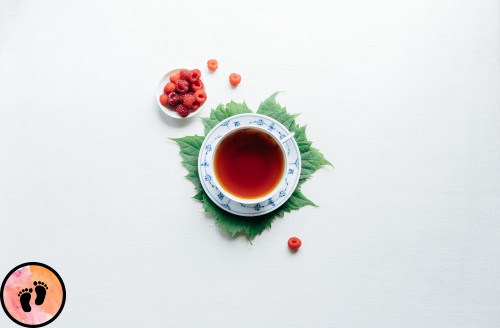Raspberry Leaf Tea in Pregnancy
Right now, we feel as if the world has become a smaller place, well, the internet has made us feel so. But once you set out to explore, you will be left in awe at the diversity that exists. Still, there is one ritual that is unique to all the communities around the world. That is a practice of making and drinking tea.
Drinking tea has a lot of benefits, which include boosting immunity, relieving stress and anxiety, lowering blood pressure etc. Tea are majorly of 2 types
1. Herbal Tea (No caffeine)
2. Non-Herbal Tea (usually contains Caffeine)
Drinking tea during pregnancy has its own benefits, especially Raspberry leaf tea which is a herbal tea.
 Raspberry Leaf Tea in Pregnancy
Raspberry Leaf Tea in PregnancySource of nutrients and antioxidants
Raspberry leaves are a rich source of vitamins, minerals and antioxidants.
- Vitamins include vitamin B, vitamin C, vitamin A, vitamin E and a number of other minerals like phosphorous, zinc, potassium, magnesium and iron.
- They provide many polyphenols like tannins and flavonoids, which act as antioxidants and they protect the cells from damage.
- The raspberry leaves contain a small amount of ellagic acids, which combat against carcinogens and promote the self-destruction of cancer-causing cells.
Is Raspberry Leaf Tea safe during pregnancy?
Although it has been for long believed that drinking raspberry would induce labour, studies conducted failed to establish a direct connection to this fact.
It acts like a uterine tonic that boosts the blood flow to the uterus and strengthens the uterine muscle fibres, thus shaping the womb for smooth delivery.
Doctors usually advise you to start consuming tea from around 32 weeks of pregnancy, start with one cup a day and build slowly to three cups until labour. It is preferred to consult with your doctor because if you are taking any other medicines before pregnancy there is always a chance that it could interfere with other medicines such as for diabetes and anti-depressants.
Benefits of drinking Raspberry Leaf Tea in pregnancy
- It is rich in vitamins, minerals and antioxidants which fight against carcinogens and have anti-inflammatory properties.
- Raspberry leaves, due to its diuretic effects, could ease puffiness caused due to water retention.
- Raspberry leaf tea lowers the blood sugar level in diabetic women, helps to regulate the irregular menstrual cycle, decreases heavy periods and lowers blood pressure.
- Drinking raspberry tea during pregnancy boosts the immune system of the expecting mothers, eases morning sickness and improves the blood circulation.
- It helps in strengthening the uterine muscles and tones the pelvic floor to prepare for childbirth.
- It boosts the breastmilk production in women.
- Raspberry tea leaves contain a compound called fragarine which tightens the walls of the uterus and makes the delivery easier.
- Drinking raspberry tea reduces the use of forceps and other interventions, and reducing chances of pre- and post-term labour.
- They help to balance hormones to improve fertility.
Side effects of drinking Raspberry Leaf Tea
1. Diuretic effect
You have to take a lot of liquids during pregnancy. In addition to that, drinking raspberry leaf tea makes you want to pee even more.
2. Affects your bowels
Many users have reported that the consumption of raspberry leaf tea during pregnancy result in a laxative effect on them.
3. Increase the chance of miscarriage in the first trimester
Raspberry leaf tea has the potential to trigger contractions if you drink it in large quantities ( more than 8 ounces or a cup per day ). You should try and avoid drinking it early during pregnancy. It is always best idea to consult your doctor before you start.
4. Estrogen-Like Effects
Raspberry leaf tea might have estrogen-like effects. It may not be safe if you have conditions which are sensitive estrogen. These include:
- Endometriosis
- Uterine fibroids
- Breast Cancer
- Uterus Cancer
Conditions to Avoid Raspberry Leaf Tea
Raspberry leaf tea might give the same output for everyone. Sometimes, they might harm us too. It's better to avoid in certain conditions like:
- If you had previous labor that lasted three hours or less, from start to finish.
- If you are scheduled to have a planned cesarean for any medical reason.
- If you have had a cesarean before.
- If you have had premature labour before.
- If you have had vaginal bleeding during the second half of pregnancy.
- If you are expecting a baby who is breech.
- If you have a family or personal history with breast or ovarian cancer.
- If you are expecting twins.
- If you have any complications or health problems in your pregnancy, including high blood pressure.
References


Recent Posts
Homemade Pregnancy Test
How to Prevent Pregnancy Stretch Marks
Is It Safe to Eat Ice Cream During Pregnancy
Breast Pain in Pregnancy
7 Tips to getting pregnant faster
COMMON INFECTIONS DURING PREGNANCY
Pregnancy Diet: Apples during Pregnancy
Advertisement
Duis leo. Donec orci lectus, aliquam ut, faucibus non
Join Our Community of Expecting Parents Today!
Subscribe to get updated on latest and relevant pregnancy-related details